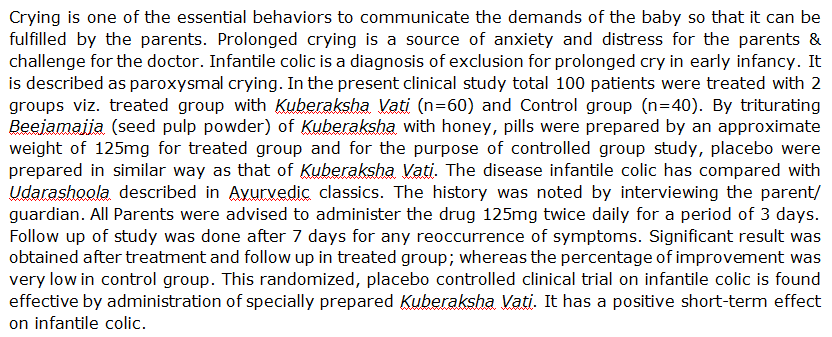A clinical study on Infantile Colic with Kuberaksha
DOI:
https://doi.org/10.21760/jaims.v6i4.1388Keywords:
Infantile colic, Udarashoola, Kuberaksha Beejamajja.Abstract
Crying is one of the essential behaviors to communicate the demands of the baby so that it can be fulfilled by the parents. Prolonged crying is a source of anxiety and distress for the parents & challenge for the doctor. Infantile colic is a diagnosis of exclusion for prolonged cry in early infancy. It is described as paroxysmal crying. In the present clinical study total 100 patients were treated with 2 groups viz. treated group with Kuberaksha Vati (n=60) and Control group (n=40). By triturating Beejamajja (seed pulp powder) of Kuberaksha with honey, pills were prepared by an approximate weight of 125mg for treated group and for the purpose of controlled group study, placebo were prepared in similar way as that of Kuberaksha Vati. The disease infantile colic has compared with Udarashoola described in Ayurvedic classics. The history was noted by interviewing the parent/ guardian. All Parents were advised to administer the drug 125mg twice daily for a period of 3 days. Follow up of study was done after 7 days for any reoccurrence of symptoms. Significant result was obtained after treatment and follow up in treated group; whereas the percentage of improvement was very low in control group. This randomized, placebo controlled clinical trial on infantile colic is found effective by administration of specially prepared Kuberaksha Vati. It has a positive short-term effect on infantile colic.
Downloads
References
Wessel MA, Cobb JC, Jackson EB. Paroxysmal fussing in infancy, sometimes called"colic". Pediatr. 1954; 14:721.
Meherban Singh. Care of the New born: Sagar printers and publishers, New Delhi; 6th Edition 2004, pp137
Savino F, Oggero R. Management of infantile colics, [Article in Italian]. Minerz’a Pediatr. 1996; 48(7.8): 313-319
Wiberg JMM, Nordsteen J, Nilsson N. The short-term effect of spinal manipulation in the treatment of infantile colic: A randomized controlled clinical trial with a blinded observer. J Manipulative Physiol Ther 1999;22:517-22.
Sushruta. Sushruta Samhita, Ambikadutta Sastri; Chaukhamba sanskrit samsthan, Varanasi, 15th edition 2002: Uttaratantra 42/78-88
Vriddhajeevaka. Kashya Samhita, P.V.Tewari; Chaukhamba vishwabharati publishers,Varanasi, 1 st edition rp.2002: Sutrasthan 25/15.
Madhavakara. Madhav Nidan, Brahmananda Tripathi; Chaukhamba surabharati prakashan, Varanasi; 1 th edition 2003: 26 chapter
Harita. Harita Samhita, Kshemaraj-srikrishnadas Publication; Mumbai, 1 th edition 1984: Tritiyasthana 7 th chapter.
Vagbhatta. Astanga Hridaya, Brahmananda Tripathy; Chaukhamba sanskrit samsthan, Delhi, 1st edition rp.2003.pp 888.
Gyanendra Pande. Dravyaguna vijnana Vol-II: Chowkhamba krishnadas Academy, Varanasi; 1st edition rp.-2004: pp 97-105.
Harita. Harita Samhita, Kshemaraj-srikrishnadas Publication; Mumbai, 1 st edition 1984: Tritiyasthana ,7 th chapter:pp 255.
Hill D J, Heine RG, Cameron DJ, et al. Role of food protein intolerance in infants with persistent distress attributed to Reflux Oesophagitis, J Pediatr 2000;136:641-7.
A Santosh Kumar, Manual of pediatric practice; Paras Medical Publisher; First edition- 2001, pp-287.
Suraj Gupte, Differential diagnosis in pediatrics; Jaypee Brothers Medical Publishers (p) ltd, New Delhi, 4 th edition 2002, pp-45-50.
Harley LM. fussing and crying in young infants. Clinical consideration and Practical Management. clin pediatr(phila)1969;8:138-41.
Gupta SK. Is colic a Gastrointestinal disorder?curr opin pediatr2002;14:588 – 92
White BP, Gunnar MR, Larson MC, DonZella B, Barr RG. Behavioural and physiological responsivity, sleep and patteren of daily cortisol production in infants with and without colic. child Dev 2000;71:862 – 77
Barr RG. Changing our understanding of infant colic. Arch pediatr Adolesc Med. 2002; 156: 1172 – 4.
Raiha H, Lehtonen L, Korhonen T, Korvenranta H, Family life 1 yr after infantile colic Arch pediatr adolesc Med 1996;150:1032 – 6.















